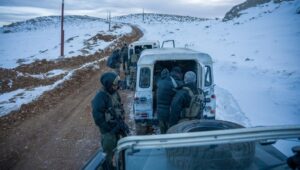By Ron Kampeas
 (JTA) — Benjamin Netanyahu ordered Israeli troops to occupy the Syrian side of a buffer zone on the Golan Heights for the first time in half a century.
(JTA) — Benjamin Netanyahu ordered Israeli troops to occupy the Syrian side of a buffer zone on the Golan Heights for the first time in half a century.
The Israeli prime minister said that the 50-year old agreement that kept the peace on the mountainous border between the two countries following the 1973 Yom Kippur War no longer holds because of attacks on United Nations posts in the area amid the ouster of dictator Bashar Assad. He said the incursion is temporary.
The army emphasized in a separate announcement on Sunday that the move is not an attempt to influence the outcome of the rebellion that led to Assad fleeing the country. The rebellion by a number of insurgent groups, led by the Islamist Hayat Tahrir al-Sham movement, swiftly took control of a number of cities over the past two weeks, including the capital Damascus.
“In accordance with the situational assessment following the recent events in Syria, including the entry of armed personnel into the buffer zone, the IDF has deployed forces in the buffer zone and in several other places necessary for its defense, to ensure the safety of the communities of the Golan Heights and the citizens of Israel,” the army statement said.
“We emphasize that the IDF is not interfering with the internal events in Syria,” it said. “The IDF will continue to operate as long as necessary in order to preserve the buffer zone and defend Israel and its civilians.”
Israeli combat aircraft reportedly struck a number of sites in Damascus and elsewhere in Syria, apparently aiming to keep lethal weapons out of the hands of the insurgents. The planes bombed weapons installations including chemical weapons facilities. Throughout the Syrian civil war, which began in 2011, Israel has bombed weapons convoys headed for the Lebanese terror group Hezbollah, which like the Assad regime is funded by Iran.
Israel captured its side of the Golan Heights from Syria in the 1967 Six Day War, and annexed the territory in 1981. Only the United States recognizes Israel’s sovereignty there. On Monday afternoon, the Israeli military said paratroops were taking “proactive” steps in the Syrian side of the buffer zone and “are conducting defense activities in the field to prevent any threat and are deployed in key positions within the buffer zone.”
The army distributed photos of troops trekking through the snow on the Syrian side of the border and video of soldiers and an earth mover establishing a new barrier. A day earlier, the army reported that armed men attacked a U.N. outpost monitoring the ceasefire agreement made in 1974, in the wake of the 1973 war.
Assad’s late father Hafez, who ruled Syria before his son, was in power when the agreement was put in place.
“This agreement held for 50 years,” Netanyahu said during a visit to an observation point on the Israeli side of the border. “Last night, it collapsed. The Syrian army abandoned its positions. We gave the Israeli army the order to take over these positions to ensure that no hostile force embeds itself right next to the border of Israel. This is a temporary defensive position until a suitable arrangement is found.”
The Israeli military chief of staff, Lt. Gen. Herzi Halevi, in a separate statement cast the incursion as part of Israel’s broader multi-front war, which began when Hamas invaded Israel’s south on Oct. 7, 2023. Netanyahu, as well as President Joe Biden and President-elect Donald Trump, said that Israel’s debilitating of Iranian proxies including Hezbollah contributed to the weakening of Iran and the downfall of Assad’s regime.
“Since last night, we have been engaged in combat on four fronts,” he said. “Ground troops are engaged in combat on four fronts: against terrorism in Judea and Samaria [the West Bank], in Gaza, in Lebanon, and last night we deployed troops into Syrian territory.”
At least one country that has relations with Israel objected to its troop movements by Monday morning: Egypt’s foreign ministry, Reuters reported, accused Israel of attempting to “force a new reality on the ground.”




